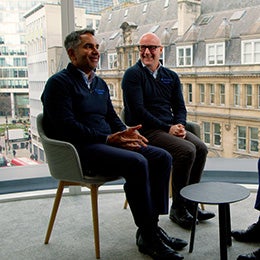
Key takeaways from the Opportunity in European Private Credit webinar
Discover how European upper mid‑market private credit may offer resilient income, attractive risk‑adjusted returns, and efficient portfolio diversification.
Our Private Credit team globally manages more than $45 billion in client assets.1
We’ve leveraged a consistent, conservative fundamental credit process for more than 30 years.1
More than 150 dedicated investment professionals across the globe.1
Invesco Private Credit partners with clients to identify attractive opportunities across the credit spectrum. Anchored by a proven, cycle-tested investment process, our 30-plus years of credit expertise support flexible capital solutions—from CLOs and syndicated loans to direct lending and distressed credit. Through disciplined underwriting and customised mandates, we dynamically deploy capital to deliver resilient, differentiated credit exposures.
A diversified suite of investment strategies offering compelling opportunities across the credit spectrum. From direct lending in the middle market to CLO investments, distressed credit, and special situations, our team combines decades of expertise to offer innovative solutions for investors.
We combine deep CLO structuring expertise with active investment across the capital stack, offering flexible solutions and access to diversified, floating-rate income.
Invesco has extensive experience in broadly syndicated loans that offer high income potential, and, when combined, can optimise capital allocation based on relative value.
We source, underwrite, and deliver broadly syndicated loans in the middle market in the US and Europe backed by deep sector research and an integrated private-side platform.
Our team goes beyond market cycles to uncover company-specific distressed credit opportunities via deep diligence, proprietary sourcing and active value creation.
Invesco’s CLO platform leverages decades of experience in structuring and managing dedicated CLO vehicles and investing across the capital stack in third party CLOs. Our scale and market presence enable us to access attractive opportunities in both primary and secondary markets, while our active management approach seeks to optimise portfolio performance through disciplined credit selection.
A CLO represents securitisations of a pool of broadly syndicated loans and can provide investors with a compelling combination of diversification, structural advantages, and floating-rate income, all while enabling investors a choice in their specific risk/return profile via the ability to invest in senior tranches, which typically offer lower risk and yield, or more junior or mezzanine and equity tranches, which provide higher return potential in exchange for greater risk.
We believe CLOs can deliver attractive risk-adjusted returns across market cycles, with their built in structural advantages set up to mitigate potential risk, and our team’s expertise in credit analysis and active management positions us to capture opportunities and deliver value for investors.
We use our credit expertise and market-leading position to provide investors unique access to attractive investment opportunities in broadly syndicated loans. Invesco’s presence across all distribution channels means we are always active in the market and able to get an early look at attractive primary and secondary opportunities. Our private-side orientation gives our analytical team an information advantage and edge in credit evaluation and execution relative to competitors.
Broadly Syndicated loans offer a combination of appealing characteristics across a range of market environments.
Our team has multi-decade experience in upper middle market lending as well as a suite of senior loan strategies focused on US, European or global opportunities.
Invesco’s direct lending team has decades of experience in sourcing, underwriting and executing broadly syndicated loans across US and European markets. Our capabilities have made us a trusted partner to leading deal sponsors seeking capital, and investors seeking compelling risk-adjusted returns.
Direct lending loans are typically accompanied by an illiquidity premium, offering additional return potential for investing in less liquid assets. This premium can range from 100 to 300 basis points, depending on market conditions.
We believe middle market direct lending can offer investors a compelling opportunity to generate significant income, with the potential for lower volatility than traditional fixed income.
In both markets, Invesco focuses on first lien broadly syndicated loans. Middle market broadly syndicated loans offer structural advantages that have the potential to meaningfully mitigate downside risk and potentially deliver a compelling combination of structural mitigations and economic advantages. These loans are positioned at the top of the capital structure, and are designed to mitigate downside risk while historically delivering attractive, interest rate-resilient returns.
Unlike traditional large-cap distressed strategies that are often dependent on market cycles, recessions or sector-specific shocks, we focus on idiosyncratic or company specific opportunities. We use our proprietary sourcing mechanism, rigorous diligence and an active approach to value creation to develop a differentiated, complementary and diversified portfolio.
Exceptional distressed credit and special situations managers are not just great stewards of investor capital – they are also strong partners for businesses. At our core, we are problem solvers and value-creators. We aim to help companies transition from challenging periods to ones of growth.
Across our investments, we target asymmetric return profiles. We seek to generate equity-like returns while assuming credit downside risk.
| Fund Name | Vehicle | Category | Download |
|---|---|---|---|
| Invesco European Upper Middle Market Income Fund | Semi-liquid, open-ended ELTIF Fund | Senior Loans and Direct Lending | Brochure |
| Invesco EUR AAA CLO UCITS ETF Acc | UCITs ETF | CLO Investments | Factsheet |
| Invesco EUR AAA CLO UCITS ETF Dist | UCITs ETF | CLO Investments | Factsheet |
| Invesco EUR AAA CLO UCITS ETF GBP Hdg Acc | UCITs ETF | CLO Investments | Factsheet |
| Invesco European Senior Loan Fund (European Zodiac) | Lux AIF | Bank Loan/Senior Loans | n/a |
| Invesco Global Senior Loan Fund (Global Zodiac) | Lux AIF | Bank Loan/Senior Loans | n/a |
| Invesco US Senior Loan Fund (US Zodiac) | Lux AIF | Bank Loan/Senior Loans | n/a |
Private credit is an asset class that can generally be defined as non-bank lending. In other words, it includes privately negotiated loans and debt financing. The private credit market typically serves borrowers that are too small to access public debt markets, or that have unique circumstances requiring a private lender.
There is no difference. In general, private credit and private debt are terms that are used interchangeably to refer to private lending – loans that are provided to companies by private investors and private markets rather than by banks or public debt markets.
Default risk is the leading risk in private credit markets. This is because private credit typically involves non-investment-grade borrowers. As such, thorough due diligence and credit expertise is important.
Without a secondary market, illiquidity is another key risk for investors who typically must hold the debt to maturity without having an off-ramp.
Global private credit assets total over $1 trillion, according to various estimates.2 Private credit assets have been growing rapidly alongside the steady growth of the private equity industry and as investors seek diversified sources of yield and income.
A syndicated loan is a collaborative financial arrangement provided by a group of lenders, known as a syndicate, to fund a single borrower, which might be a corporation, large project, or sovereign government. This structure emerges when the financial requirements surpass the capacity of a single lender or when expertise in a particular asset class is necessary. By forming a syndicate, lenders can diversify their risk and access financial ventures too significant for individual lenders.
Direct lending means providing capital to companies or businesses without the benefit of an intermediary. In other words, you’re directly lending to a company. Direct origination loans offer an illiquidity premium, providing additional returns for investing in less liquid assets.
The upper middle market consists of larger, well-capitalised companies with strong balance sheets, having provided a stable investment environment. These companies are generally more resilient to economic fluctuations and have offered reliable returns.
Distressed credit involves investing in the senior debt of companies at significant discounts to par, usually due to perceived fundamental weakness.
Returns are generated by investing in companies where, over the longer-term and through various actions, meaningful upside potential can be unlocked.

Key takeaways from the Opportunity in European Private Credit webinar
Discover how European upper mid‑market private credit may offer resilient income, attractive risk‑adjusted returns, and efficient portfolio diversification.

A new partnership to help advisers rethink the possibilities of private markets
We are excited to announce a new partnership designed to help investors realise the full return potential of the global economy by unlocking new opportunities in private markets.

Private credit: Attractive risk-adjusted return potential in the new year
The private credit market delivered strong returns in 2025. Can investors expect the same in 2026? Our experts discuss where they’re seeing potential for compelling risk-adjusted returns.

Understanding CLOs: A guide to collateralised loan obligations
Discover how Collateralised Loan Obligations (CLOs) can offer portfolio diversification, active management, and access to resilient leveraged loans for professional investors.

A new approach to investing in AAA-rated CLOs
Unlocking access to a growing asset class with actively managed ETFs.

Discover alternative investments with Invesco, ideal for anyone looking for diversification, inflation protection or capital growth.

Discover how to invest in private markets with Invesco's investment platform. Invesco delivers client-centric solutions and private market offerings including real estate and private credit.

Learn about the benefits of real estate investing with Invesco, one of the largest real estate investment managers worldwide with a global approach.